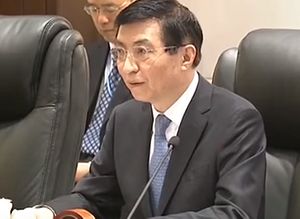Wang Huning, 62, was elevated to the seven-member Politburo Standing Committee (PSC) of the Chinese Communist Party — the highest decision-making body of China — during the 19th Party Congress in October. He currently holds the position of member of the Secretariat of the CCP Central Committee, a body serving the PSC to manage routine decisions. In practice, he oversees China’s ideological organs, including China’s media and propaganda department. Thus, he has been widely regarded as China’s new ideology czar.
In November, Yi Wang, co-author of “The Hidden Ruler: Wang Huning and the Making of Contemporary China,” wrote a profile of Wang Huning for The Diplomat. In the article, the author argued that the challenge for Wang now is “how to hide his light under the glaring sun.”
Wang’s first month-plus in office has shown that he has been trying hard to cope with the challenge. Despite the fact that his new role requires frequent appearances in front of cameras and flashing lights, Wang appeared to maintain as low a profile as he can through delicate media control.
For example, on December 2, China opened the fourth World Internet Conference in Wuzhen, Zhejiang province. Wang, as the most senior political leader who attended the conference, made a 17-minute opening speech. According to China’s traditional practice, Wang’s presentation should have won the most exposure in Chinese media. The reality turned to be the opposite; no Chinese media outlet has fully covered Wang’s speech or published his full speech script. That contradiction was a typical product of Chinese media control.
In sharp contrast, the foreign media paid more attention to Wang’s “first major speech” in front of a worldwide audience.
Interestingly, Xi Jinping, although he didn’t show up to the World Internet Conference this year, still won headlines in Chinese media. Xi sent a congratulatory letter to the audience, and the letter then dominated all the reports published by Chinese state media outlets. Even in the reports that briefly mentioned Wang’s speech, it appeared that Wang repeatedly quoted Xi’s remarks and refrained from expressing too much of his own ideas.
As The Diplomat reported earlier, when Wang took center stage in the Chinese media for the first time and made a public speech in early November, he practiced exactly the same protocol. At the 27th China Journalism Awards ceremony, Xi wrote a congratulatory letter to the event. Then Wang made a short and brief speech in which he repeatedly quoted Xi’s remarks, in an attempt not to steal Xi’s thunder.
Despite his low profile, Wang has been actually quite busy since he took his new post. According to People’s Daily Online, Wang has been up to his ears in various conferences and high-level meetings with foreign leaders in the past month and a half. All those high-profile activities should have earned Wang a large amount of media exposure. However, thanks to China’s media control, Xi’s story — no matter how insignificant it really was — has always appeared at the very top of every Chinese news website, while Wang’s story is cautiously squeezed into a not too obvious location.

































